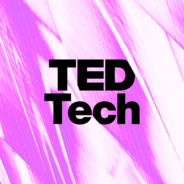The universe that we know, with its luminous stars and orbiting planets, is largely made up of elements we can't actually see -- like dark energy and dark matter -- and therefore don't fully understand. Theoretical physicist Chanda Prescod-Weinstein takes us inside the search for this cosmos-shaping invisible matter and explains how, with the help of a new generation of telescopes, we could be closer to demystifying it than ever before. "The universe is more queer and fantastical than it looks to the naked eye," she says. After the talk, our host Sherrell talks about the importance of inclusivity when it comes to who gets credit for technological advances.(If you want to hear more from Prescod-Weinstein, check out her episode on "The TED Interview" podcast wherever you're listening to this.)For a chance to give your own TED Talk, fill out the Idea Search Application: ted.com/ideasearch.Interested in learning more about upcoming TED events? Follow these links:TEDNext: ted.com/futureyouTEDAI Vienna: ted.com/ai-vienna Hosted on Acast. See acast.com/privacy for more information.

Wissenschaft & Technik
TED Tech Folgen
From the construction of virtual realities to the internet of things to the watches on our wrists—technology's influence is everywhere. Its role in our lives is evolving fast, and we're faced with riveting questions and tough challenges that sit at the intersection of technology and humanity. Listen in every Friday, with host, journalist Sherrell Dorsey, as TED speakers explore the way tech shapes how we think about society, science, design, business, and more.Follow Sherrell on Instagram @sherrell_dorsey and on LinkedIn @sherrelldorsey Hosted on Acast. See acast.com/privacy for more information.
Folgen von TED Tech
223 Folgen
-
Folge vom 09.06.2023How we could solve the dark matter mystery | Chanda Prescod-Weinstein
-
Folge vom 02.06.2023Cultivating good power with longtime IBM CEO Ginni Rometty | ReThinking with Adam GrantGinni Rometty rose through the ranks at IBM to become their first female CEO. After leading the iconic tech company from 2012 to 2020, Ginni chronicled the experiences and lessons learned in her memoir, “Good Power.” In a candid conversation at the Authors@Wharton series, Ginni talks with Adam about cultivating and harnessing influence, leading change through highlighting what will stay the same, and her cautious optimism about the future of AI. For episodes on the psychology of the world's most interesting minds, follow ReThinking wherever you're listening to this. Transcripts for ReThinking are available at go.ted.com/RWAGscripts.For a chance to give your own TED Talk, fill out the Idea Search Application: ted.com/ideasearch.Interested in learning more about upcoming TED events? Follow these links:TEDNext: ted.com/futureyouTEDAI Vienna: ted.com/ai-vienna Hosted on Acast. See acast.com/privacy for more information.
-
Folge vom 26.05.2023Why people and AI make good business partners | Shervin KhodabandehWhat happens when the data-driven capabilities of AI are combined with human creativity and ingenuity? Shining a light on the opportunities this futuristic collaboration could bring to the workplace, AI expert Shervin Khodabandeh shares how to redesign companies so that people and machines can learn from each other. Hear more after the episode from our new host, Sherrell Dorsey, on the potential promises (and pitfalls) of AI-work integration.For a chance to give your own TED Talk, fill out the Idea Search Application: ted.com/ideasearch.Interested in learning more about upcoming TED events? Follow these links:TEDNext: ted.com/futureyouTEDAI Vienna: ted.com/ai-vienna Hosted on Acast. See acast.com/privacy for more information.
-
Folge vom 19.05.2023What if buildings created energy instead of consuming it? | Ksenia PetrichenkoBuildings are bad news for the climate -- but they don't have to be. While our structures are currently responsible for a third of global energy consumption and emissions, a future where they create more energy than they consume is possible. Energy policy analyst Ksenia Petrichenko has a three-tiered strategy for thinking differently about buildings, transforming them from passive users to active players in the energy system and bringing us closer to our climate targets.For a chance to give your own TED Talk, fill out the Idea Search Application: ted.com/ideasearch.Interested in learning more about upcoming TED events? Follow these links:TEDNext: ted.com/futureyouTEDAI Vienna: ted.com/ai-vienna Hosted on Acast. See acast.com/privacy for more information.
